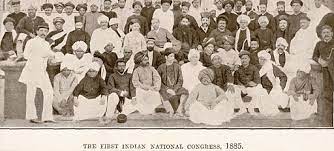The First Session of Indian National Congress was held in Bombay (now Mumbai). The Indian National Congress was founded in 1885. The Congress Party was formed with the objective of representing the interests of the Indian people, particularly those who were not represented in the British colonial government.

The first session of the Indian National Congress was attended by 72 delegates, who represented different parts of India. The delegates included lawyers, journalists, teachers, and social reformers. The session was presided over by Womesh Chunder Bonnerjee, who was a prominent lawyer from Calcutta (now Kolkata).
The first session of the Indian National Congress was a significant event in Indian history, as it marked the beginning of the country’s struggle for independence from British colonial rule. The delegates at the session discussed a range of issues that affected the Indian people, such as the need for greater representation in the colonial government, the demand for greater civil liberties, and the need for economic and social reforms.
One of the most important resolutions passed at the first session of the Indian National Congress was the demand for greater representation of Indians in the colonial government. The delegates argued that the Indian people had the right to participate in the governance of their own country and that the colonial government should not exclude them from decision-making processes.
Another important resolution passed at the session was the demand for the repeal of the Arms Act, which was enacted by the colonial government to disarm the Indian people. The delegates argued that this law was unjust and discriminatory and that the Indian people had the right to bear arms for self-defense.
It also saw the adoption of the Congress Party’s official symbol, which was the spinning wheel. The spinning wheel represented the need for economic self-sufficiency and the revival of the Indian textile industry.
In conclusion, the first session of the Indian National Congress was a significant event in Indian history, as it marked the beginning of the country’s struggle for independence from British colonial rule. The session was attended by delegates who represented different parts of India and who discussed a range of issues that affected the Indian people. The resolutions passed at the session demanded greater representation of Indians in the colonial government, the repeal of the Arms Act, and the need for economic and social reforms. The adoption of the spinning wheel as the Congress Party’s official symbol represented the need for economic self-sufficiency and the revival of the Indian textile industry.
Important Links